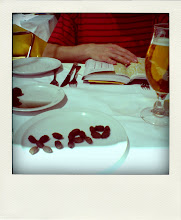海子去世以后,我写过一篇名为《怀念》的文章,那篇文章是这样开头的:“诗人海子的死将成为我们 这个时代的神话之一。”现在5年过去了,海子的确成了一个神话:他的诗被模仿;他的自杀被谈论;有人张罗着要把海子的剧本《弑》谱成歌导剧;有人盘算着想 把海子的短诗拍成电视片;学生们在广场或朗诵会上集体朗诵海子的诗;诗歌爱好者们跑到海子的家乡去祭奠;有人倡议设立中国诗人节,时间便定在海子自杀的3 月 26日;有人为了写海子传而东奔西跑;甚至有人从海子家中拿走了(如果不说是“掠走了”)海子的遗嘱、海子用过的书籍以及医生对海子自杀的 诊断书(这些东西如今大部分都已被追回)。海子在孤独寂寞中度过了一生,死后为众人如此珍视,敬仰,甚至崇拜,这在中国现当代文学史上,恐怕是绝无仅有的 事。我们由此也可以看出诗歌的力量所在。当然,很难说在对海子的种种缅怀与谈说中没有臆想和误会,很难说这里面没有一点围观的味道。忽然有那么多人自称是 海子的生前好友,这不能不让人怀疑到他们是想从海子自杀这件事上有所收益,他们是想参与到一个必将载入史册的“事件”当中来。
或许臆想和误会悉属正常。一个人选择死亡也便选择了别人对其死亡文本的误读。个人命运在一个人死后依然作用于他,这是一个值得我们深思的问题。在海子 自杀这件事上,我们不可避免地面对两种反应:一种是赞佩,一种是愤怒。有时我们会听到这样一种高声断喝:“海子是个法西斯!”“海子是自我膨胀的典型!” 有一种观点把海子变成了武侠小说中的人物,认为海子是那类练黑道武功的杀手,虽然武艺高强,但到底不是正宗,因此自身积郁了太多的毒素。海子最终是为自身 的毒素所害。大体说来,海子自杀激怒了两类人:一类是那些怀有高尚然而脆弱的道德理想的读者;另一类便是自身尚在谋取功名的诗人。我在美国出版的《一行》 诗刊上读到过这样一句莫名其妙的叹语:“怎么让这小子玩了头一把?”似乎在自杀上也有一个优先权的问题,似乎海子从对诗歌语言的霸占最终走到了对死亡的霸占,似乎海子的死废掉了别人的死。这几年诗歌界内部对海子诗歌的评价较之1989年已经有了很大的不同,比如有些人认为海子的诗歌写作其实尚处于依赖青春激情的业余写作 阶段,并未真正进入专业写作,又比如认为海子只有他的梦想却没有他的方法论。这些观点或许都有道理,但是否也有人依然把海子视作一个挡道的人呢?
不过,尽管人们对海子的评价五花八门,但有一点是肯定的:海子的死带给了人们巨大和持久的震撼。在这样一个缺乏精神和价值尺度的时代,有一个诗人自杀 了,他逼使大家重新审视,认识诗歌与生命。但是,理论界似乎对此准备不足,因此反应得有些措手不及,这一点从有人将海子与屈原、王国维、朱湘,甚至希尔维 亚?普拉斯扯在一起就能看出。这种草率的归类表明,人们似乎找不到现成的、恰当的语言来谈论海子,人们似乎不知道怎样给海子定位。于是便有了一些想当然的 见解。四川诗人钟鸣在其文章《中间地带》里,把海子说成是一个奔走于小城昌平和首都北京之间的人,认为海子在两个地方都找不到自己的家,因此便只好让自己 在精神上处于一种中间地带。上海评论家朱大可在其《宗教诗人:海子与骆一禾》一文中,赋予海子的死以崇高的仪典意义;于是海子便成了一个英雄,成了20世 纪末中国诗坛为精神而献身的象征。朱文认为海子选择在山海关自杀也有其特殊的用意,因为山海关是长城的起点,是“巨大的种族之门”,与历史上最大的皇权专 制有关。我想,海子若真做此想,那么他定然脱不了演戏的干系,他的自杀也便成了自我献祭。而事实上,海子并没有选择山海关,而是选择了山海关至龙家营之间 的一段火车慢行道。那是一个适于自杀的地点,海子之前,曾有三个人在那里自杀。
或许臆想和误会悉属正常。一个人选择死亡也便选择了别人对其死亡文本的误读。个人命运在一个人死后依然作用于他,这是一个值得我们深思的问题。在海子 自杀这件事上,我们不可避免地面对两种反应:一种是赞佩,一种是愤怒。有时我们会听到这样一种高声断喝:“海子是个法西斯!”“海子是自我膨胀的典型!” 有一种观点把海子变成了武侠小说中的人物,认为海子是那类练黑道武功的杀手,虽然武艺高强,但到底不是正宗,因此自身积郁了太多的毒素。海子最终是为自身 的毒素所害。大体说来,海子自杀激怒了两类人:一类是那些怀有高尚然而脆弱的道德理想的读者;另一类便是自身尚在谋取功名的诗人。我在美国出版的《一行》 诗刊上读到过这样一句莫名其妙的叹语:“怎么让这小子玩了头一把?”
不过,尽管人们对海子的评价五花八门,但有一点是肯定的:海子的死带给了人们巨大和持久的震撼。在这样一个缺乏精神和价值尺度的时代,有一个诗人自杀 了,他逼使大家重新审视,认识诗歌与生命。但是,理论界似乎对此准备不足,因此反应得有些措手不及,这一点从有人将海子与屈原、王国维、朱湘,甚至希尔维 亚?普拉斯扯在一起就能看出。这种草率的归类表明,人们似乎找不到现成的、恰当的语言来谈论海子,人们似乎不知道怎样给海子定位。于是便有了一些想当然的 见解。四川诗人钟鸣在其文章《中间地带》里,把海子说成是一个奔走于小城昌平和首都北京之间的人,认为海子在两个地方都找不到自己的家,因此便只好让自己 在精神上处于一种中间地带。上海评论家朱大可在其《宗教诗人:海子与骆一禾》一文中,赋予海子的死以崇高的仪典意义;于是海子便成了一个英雄,成了20世 纪末中国诗坛为精神而献身的象征。朱文认为海子选择在山海关自杀也有其特殊的用意,因为山海关是长城的起点,是“巨大的种族之门”,与历史上最大的皇权专 制有关。我想,海子若真做此想,那么他定然脱不了演戏的干系,他的自杀也便成了自我献祭。而事实上,海子并没有选择山海关,而是选择了山海关至龙家营之间 的一段火车慢行道。那是一个适于自杀的地点,海子之前,曾有三个人在那里自杀。
本来在写了《怀念》那篇文章之后,我就不打算再拿海子做任何文章。我想我的责任是把海子的诗 歌整理发表出来,使之不致湮没、失散。至于如何评价海子的诗歌及他的自杀,应该由一些更加客观的人去探讨。特别是关于他的自杀,我一直不愿意说得太多。在 我看来,一个活着的人是没有资格去谈论他们的死亡的(我们顶多只能谈谈我们对自己的死亡的猜测),而一个握有死亡这枚大印的人,甚至可以蔑视恺撒这样的强 权。当然,我也知道约翰?顿说过这样的话:“无论谁死了,/我都觉得是我自己的一部分在死亡。/因为我包含在人类这个概念里。因此我从不问丧钟为谁而鸣, /它为我,也为你。”我想约翰?顿虽然指出每一个人的死都与我们有关,但他绝无意使每一个人的死都成为一种话语。换言之,我们从那死去的人身上所看到的, 不是那人的死而是我们自己的死。这种醒悟使我们向生命睁开眼睛,知道我们还活着,而且还不得不忍受太具体的生活内容。
海子去世以后,理论界大多是从形而上的角度来对海子加以判断。我不否认海子自杀有其形而上的原因,更不否认海子之死对于我们这个时代的精神意义,但若 我们仅把海子框定在一种形而上的光环之内,则我们便也不能洞见海子其人其诗,长此以往,海子便也真会成为一个幻像。在诗人自杀这个问题上,还是加缪有着一 种更加实在,也是更加站得住脚的看法。他在《西西弗的神话》一书中指出:“人们极少(但不能排除)因为反思而自杀。”的确,每一个人的自杀都有他的导火 索,海子也不例外。5 年来,我对导致海子自杀的一些具体原因不愿多谈,是怕使海子受到伤害。但当我看到人们在思考海子自杀这个问题上越走越远,而且在诗歌写作和诗人行为上带来 某些不良影响时,我又颇感不安。为此我写下这篇文章,以期澄清某些基本事实,但愿它们不会为某些居心不良的人所利用。
以下是我所知和我所猜测的海子自杀的原因:
①自杀情结海子是一个有自杀情结的人。我在《怀念》中已经引述过海子于1986年写下的一篇日记,那篇日记记于他一次未遂自 杀之后。此外,我们从海子的大量诗作中(如发表于1989年第一、二期《十月》上的《太阳·诗剧》和他至今未发表过的长诗《太阳·断头篇》等),也可以找 到海子自杀的精神线索。他在诗中反复、具体地谈到死亡--死亡与农业、死亡与泥土、死亡与天堂,以及鲜血、头盖骨、尸体等等。海子对于死亡的谈论甚至不仅 限于诗歌写作中。他死后,朋友们回忆起他生前说过的一些话,深悔从前没有太留意。有一位海子在昌平的友人告诉我,海子甚至同他谈到过自杀的方式。海子选择 卧轨,或许是因为他不可能选择从飞机上往下跳;在诸种可能的自杀方式中,卧轨似乎是最便当、最干净、最尊严的一种方式。我想海子是在死亡意象、死亡幻像、 死亡话题中沉浸太深了,这一切对海子形成了一种巨大的暗示。人说话应该避谶,而海子是一个不避谶的人。这使得他最终不可控制地朝自身的黑暗陷落。海子的另 一个自我暗示是“天才短命”。在分析了以往作家、艺术家的工作方式与其寿限的神秘关系后,海子得出这一结论;他尊称那些“短命天才”为光洁的“王子”。或 许海子与那些“王子” 有着某种心理和写作风格上的认同,于是“短命”对他的生命和写作方式形成了巨大的压力。关于这一点,我们在后面探究海子的写作方式与其写作理想的矛盾时还会谈到。
海子对自己自杀的看法或许与那些批评家的看法有较大不同。谁知道呢?也许那些批评家是正确的,而海子自己反倒说不清自己为什么而死。但我想我们至少应 该了解海子的形而上学,那就是:“道家暴力”。我一直不太明白“道家暴力”到底是什么意思。道者,天道,太初有道之道,道可道非常道之道,可这与暴力有什 么关系呢?海子把道形象化为一柄悬挂于头顶的利斧,可道为什么只能是利斧而不能是别的呢?1987年以后,海子放弃了其诗歌中母性、水质的爱,而转向一种 父性、烈火般的复仇。他特别赞赏鲁迅对待社会、世人“一个也不原谅”的态度。他的复仇之斧、道之斧挥舞起来,真像天上那严厉的“老爷子”。但海子毕竟是海 子,他没有把这利斧挥向别人,而是挥向了自己,也就是说他首先向自己复仇。他蔑视那“自我原谅”的抒情诗。他死于道。
海子去世以后,理论界大多是从形而上的角度来对海子加以判断。我不否认海子自杀有其形而上的原因,更不否认海子之死对于我们这个时代的精神意义,但若 我们仅把海子框定在一种形而上的光环之内,则我们便也不能洞见海子其人其诗,长此以往,海子便也真会成为一个幻像。在诗人自杀这个问题上,还是加缪有着一 种更加实在,也是更加站得住脚的看法。他在《西西弗的神话》一书中指出:“人们极少(但不能排除)因为反思而自杀。”的确,每一个人的自杀都有他的导火 索,海子也不例外。
以下是我所知和我所猜测的海子自杀的原因:
①自杀情结
海子对自己自杀的看法或许与那些批评家的看法有较大不同。谁知道呢?也许那些批评家是正确的,而海子自己反倒说不清自己为什么而死。但我想我们至少应 该了解海子的形而上学,那就是:“道家暴力”。我一直不太明白“道家暴力”到底是什么意思。道者,天道,太初有道之道,道可道非常道之道,可这与暴力有什 么关系呢?海子把道形象化为一柄悬挂于头顶的利斧,可道为什么只能是利斧而不能是别的呢?1987年以后,海子放弃了其诗歌中母性、水质的爱,而转向一种 父性、烈火般的复仇。他特别赞赏鲁迅对待社会、世人“一个也不原谅”的态度。他的复仇之斧、道之斧挥舞起来,真像天上那严厉的“老爷子”。但海子毕竟是海 子,他没有把这利斧挥向别人,而是挥向了自己,也就是说他首先向自己复仇。他蔑视那“自我原谅”的抒情诗。他死于道。
②性格因素 要探究海子自杀的原因,不能不谈到他的性格。他纯洁,简单,偏执,倔 强,敏感,爱干净,喜欢嘉宝那样的女人,有时有点伤感,有时沉浸在痛苦之中不能自拔。在多数情况下,海子像一只绵羊一样对待他人。有一回海子的一个同事给 他送信,因为信有好多封,那人便一边读着信封上海子的名字--“海子海子海子”--一边把信递给他。可是忽然,送信人不再读“海子海子海子”,而改口为“ 孙子孙子孙子”,海子觉得送信人是在说着玩,便只是笑,倒是站在一旁的骆一禾火了起来,把送信人大骂一顿。一般说来,海子是温和的,但他也有愤怒的时候, 而且愤怒起来像一只豹子。有一回他在饭馆里一个人和几个人打起架来,结果打碎了眼镜,脸上也留下了血痕。事后他对我说,因为当时他真把命豁出去了,所以他 一个人和那几个人打了个平手。
海子性格的形成,应该既有其先天因素,也有其后天因素。所谓后天因素,自然指的是其农业背景。海子是农业的儿子,他迷恋泥土,对于伴随着时代发展而消 亡的某些东西,他自然伤感于心。1989年初,海子回了趟安徽。这趟故乡之行给他带来了巨大的荒凉之感。“有些你熟悉的东西再也找不到了,”他说。“你在 家乡完全变成了个陌生人!”至于先天因素,我指的是他的星座。海子生于1964年4月2日,属白羊星座。如果我们不仅仅是出于迷信的兴趣来看待他的星座的 话,我们至少可以在这里发现某些有趣的东西。海子一生热爱梵?高,称梵?高为“瘦哥哥”,而梵?高恰恰也是白羊星座生人,这其中难道没有什么神秘的联系 吗?是否生于这个星座的人都有一种铤而走险的倾向?早在1984年,海子就写过一首献给梵?高的诗,名为《阿尔的太阳》。诗中写道:瘦哥哥梵高,梵高啊/ 从地下强劲喷出的/火山一样不计后果的/是丝杉和麦田/还有你自己/喷出多余的活命时间这首诗写的是梵高,难道我们不可以把它看作是海子的某种自况吗?“ 不计后果”这个词,用在海子身上多么贴切!
③生活方式海子的生活相当封闭。我在《怀念》一文中对此已有所描述。我要补充的一点是,海子似乎拒绝改变他生活的封闭性。他宁可生活在威廉?布莱克所说的“天真”状态,而拒绝进入一种更完满、丰富,当然也是更危险的“经验”状态。
1988年底,一禾和我先后结了婚,但海子坚持不结婚,而且劝我们也别结婚。他在昌平曾经有一位女友,就因为他拒绝与人家结婚,人家才离开了他。我们 可以想像海子在昌平的生活是相当寂寞的;有时他大概是太寂寞了,希望与别人交流。有一次他走进昌平一家饭馆。他对饭馆老板说:“我给大家朗诵我的诗,你们 能不能给我酒喝?”饭馆老板可没有那种尼采式的浪漫,他说:“我可以给你酒喝,但你别在这儿朗诵。”我想是简单、枯燥的生活害了海子;他的生活缺少交流, 即使在家里也是如此。他同家人的关系很好,同大弟弟查曙明保持着通信联系。但他的家人不可能理解他的思想和写作。据说在家里,他的农民父亲甚至有点儿不敢 跟他说话,因为他是一位大学老师。海子死前给家里买了一台黑白电视机。有一段时间,海子自己大概也觉得在昌平的生活难以忍受。他想在市里找一份工作,这样 就可以住得离朋友们近一些。但是要想在北京找一份正式的、稳定的工作谈何容易。海子的死使我对人的生活方式颇多感想,或许任何一个人都需要被一张网罩住, 而这张网就是社会关系之网。一般说来,这张网会剥夺我们生活的纯洁性,使我们疲于奔跑,心绪难定,使我们觉得生命徒耗在聊天、办事上,真如行尸走肉。但另 一方面,这张网恐怕也是我们生存的保障,我们不能否认它也有可靠的一面。无论是血缘关系,还是婚姻关系,还是社会关系,都会像一只只手紧紧抓住你的肩膀; 你即使想离开也不太容易,因为这些手会把你牢牢按住。但海子自杀时显然没有按住他肩膀的有力的手。
海子性格的形成,应该既有其先天因素,也有其后天因素。所谓后天因素,自然指的是其农业背景。海子是农业的儿子,他迷恋泥土,对于伴随着时代发展而消 亡的某些东西,他自然伤感于心。1989年初,海子回了趟安徽。这趟故乡之行给他带来了巨大的荒凉之感。“有些你熟悉的东西再也找不到了,”他说。“你在 家乡完全变成了个陌生人!”至于先天因素,我指的是他的星座。海子生于1964年4月2日,属白羊星座。如果我们不仅仅是出于迷信的兴趣来看待他的星座的 话,我们至少可以在这里发现某些有趣的东西。海子一生热爱梵?高,称梵?高为“瘦哥哥”,而梵?高恰恰也是白羊星座生人,这其中难道没有什么神秘的联系 吗?是否生于这个星座的人都有一种铤而走险的倾向?早在1984年,海子就写过一首献给梵?高的诗,名为《阿尔的太阳》。诗中写道:瘦哥哥梵高,梵高啊/ 从地下强劲喷出的/火山一样不计后果的/是丝杉和麦田/还有你自己/喷出多余的活命时间这首诗写的是梵高,难道我们不可以把它看作是海子的某种自况吗?“ 不计后果”这个词,用在海子身上多么贴切!
③生活方式
1988年底,一禾和我先后结了婚,但海子坚持不结婚,而且劝我们也别结婚。他在昌平曾经有一位女友,就因为他拒绝与人家结婚,人家才离开了他。我们 可以想像海子在昌平的生活是相当寂寞的;有时他大概是太寂寞了,希望与别人交流。有一次他走进昌平一家饭馆。他对饭馆老板说:“我给大家朗诵我的诗,你们 能不能给我酒喝?”饭馆老板可没有那种尼采式的浪漫,他说:“我可以给你酒喝,但你别在这儿朗诵。”我想是简单、枯燥的生活害了海子;他的生活缺少交流, 即使在家里也是如此。他同家人的关系很好,同大弟弟查曙明保持着通信联系。但他的家人不可能理解他的思想和写作。据说在家里,他的农民父亲甚至有点儿不敢 跟他说话,因为他是一位大学老师。海子死前给家里买了一台黑白电视机。有一段时间,海子自己大概也觉得在昌平的生活难以忍受。他想在市里找一份工作,这样 就可以住得离朋友们近一些。但是要想在北京找一份正式的、稳定的工作谈何容易。海子的死使我对人的生活方式颇多感想,或许任何一个人都需要被一张网罩住, 而这张网就是社会关系之网。一般说来,这张网会剥夺我们生活的纯洁性,使我们疲于奔跑,心绪难定,使我们觉得生命徒耗在聊天、办事上,真如行尸走肉。但另 一方面,这张网恐怕也是我们生存的保障,我们不能否认它也有可靠的一面。无论是血缘关系,还是婚姻关系,还是社会关系,都会像一只只手紧紧抓住你的肩膀; 你即使想离开也不太容易,因为这些手会把你牢牢按住。但海子自杀时显然没有按住他肩膀的有力的手。
④荣誉问题 弥尔顿说过:追求荣誉是所有伟大人的通病。我想海子也不是一个对被社 会承认毫无兴趣的人。但和所有中国当代诗人一样,海子也面临着两方面的阻力。一方面是社会对于诗人的不信任,以及同权力结合在一起守旧文学对于先锋文学的 抵抗。这不是一个文学问题而是一个政治问题。另一方面是受到压制的先锋文学界内部的互不信任、互不理解、互相排斥。海子生前(甚至死后)可谓深受其害。尽 管我们几个朋友早就认识到了海子的才华和作品的价值,但事实上1989年以前大部分青年诗人对海子的诗歌持保留态度。诗人AB在给海子的信中就曾批评海子 的诗歌 “水份太大”。1988年左右,北京有一个诗歌组织,名为“幸存者”。有一次“幸存者”的成员们在诗人CD家里聚会,会上有诗人EFG 和HI对海子的长诗大加指责,认为他写长诗是犯了一个时代性的错误,并且把他的诗贬得一无是处(海子恰恰最看重自己的长诗,这是他欲建立其价值体系与精神 王国的最大的努力。他认为写长诗是工作而短诗仅供抒情之用)。 1987年,海子到南方去旅行了一趟。回京后他对骆一禾说,诗人JK人不错,我 们在北京应该帮帮他。可是时隔不久,海子在一份民间诗刊上读到了此人的一篇文章,文中大概说到:从北方来了一个痛苦的诗人,从挎包里掏出上万行诗稿。这篇 文章的作者评论道:“人类只有一个但丁就够了。”“此人(指海子)现在是我的朋友,将来会是我的敌人。”海子读到这些文字很伤心,竟然孩子气地跑到一禾处 哭了一通。这类超出正常批评的刺激文字出自我们自己的朋友实在有些说不过去,因为几乎在同时,北京作协在北京西山召开诗歌创作会议,会上居然有人给海子罗 列了两项 “罪名”:“搞新浪漫主义”和“写长诗”。海子不是作协会员,当然不可能去参加会议,于是只有坐在家里生闷气,而对于那浅见蠢说毫无 还击之力。在所有这些令人不解和气愤的事情当中,有一件事最为恶劣。海子生前发表作品并不顺畅,与此同时他又喜欢将写好的诗打印出来寄给各地的朋友们,于 是便有当时颇为著名的诗人LMN整页整页地抄袭海子的诗,并且发表在杂志上,而海子自己都无法将自己 的作品发表。后来,此人欲编一本诗集,一禾、海子 和我便拒不参加。
⑤气功问题有一件事人们或许已有所耳闻,但我却一直不愿谈论,因为我怕某些人会对此加以利用。现在为了客观起见,我想我应该 在此谈一谈。这件事情便是海子对气功的着迷。练气功的诗人和画家我认识几个,据说气功有助于写作,可以给人以超凡的感觉。海子似乎也从练气功中悟到了什 么。他跟他的一位同事,也是朋友,学气功。有一回他高兴地告诉我,他已开了小周天。他可能是在开大周天的时候出了问题。他开始出现幻听,总觉得有人在他耳 边说话,搞得他无法写作。而对海子来说,无法写作就意味着彻底失去了生活。也是在那时,海子对自己的身体也有某种幻觉,他觉得自己的肺已经全部烂掉了。海 子前后留有三封遗书。他留给父母的那封遗书写得最为混乱,其中说到有人要谋害他,要父母为他报仇。但他的第三封遗书(也就是他死时带在身上的那封遗书)却 显得相当清醒。他说:“我的死与任何人无关。”海子自杀后医生对海子的死亡诊断为“精神分裂症”。海子所在的学校基本上是据此处理海子自杀的事的。但我 想,无论是医生还是中国政法大学校方都不可能真正、全面地了解海子其人。倘若有人要充当冷酷的旁观者来指责或嘲弄海子,那么实际上他也是在指责和嘲弄他自 己。他至少忘记了他自己,忘记了我们每一个人的具体的生存。
⑥自杀导火索每一个人的自杀都有他的导火索。作为海子自杀诸多可能的原因之一,海子的爱情生活或许是最重要的。在自杀前的那 个星期五,海子见到了他初恋的女朋友。这个女孩子1987年毕业于中国政法大学,在做学生时喜欢海子的诗。在我的印象中,她是中等身材,有一张圆圆的脸 庞。她大概和去年去世的内蒙古诗人薛景泽(雁北)有点亲戚关系。海子最初一些诗大多发表在内蒙的刊物上恐怕与这个女孩子有关。她是海子一生所深爱的人,海 子为她写过许多爱情诗,发起疯来一封情书可以写到两万字以上。至于他们到底是因为什么分手的,我不得而知。但在海子最后一次见到她时,她已在深圳建立了自 己的家庭。海子见到她,她对海子很冷淡。当天晚上,海子与同事喝了好多酒。他大概是喝得太多了,讲了许多当年他和这个女孩子的事。第二天早上酒醒过来,他 问同事他昨天晚上说了些什么,是不是讲了些他不该说的话。同事说你什么也没说,但海子坚信自己讲了许多会伤害那个女孩子的话。他感到万分自责,不能自我原 谅,觉得对不起自己所爱的人。海子大概是25日早上从政法大学在北京学院路的校址出发去山海关的。那天早上我母亲在上班的路上看到了从学院路朝西直门火车 站方向低头疾走的海子。当时我母亲骑着自行车;由于急着上班,而且由于他和海子距离较远,不敢肯定那是不是海子,便没有叫他。现在推算起来,如果那真是海 子,那么他中午便应到了山海关,我想任何人,心里难处再大,一经火车颠荡,一看到大自然,胸中郁闷也应化解了。看来海子是抱定了自杀的决心。他大概在山海 关呆了了一下午,第二天又在那闲逛了一上午,中午开始延着铁道朝龙家营方向走去。
⑤气功问题
⑥自杀导火索
⑦写作方式与写作理想 以上我谈的都是一些具体的事情。但正如加缪所说:“最清楚 的原因并不是直接引起自杀的原因。”我想海子的自杀应该也有其更加内在原因,那就是他的写作。记得有一次海子、白马和我在骆一禾家里聚谈,大家谈到写作就 像一个黑洞,海子完全赞同这种看法。海子献身于写作,在写作与生活之间没有任何距离。所以确切地说海子是被这个黑洞吸了进去。
我们在前面已经谈到,海子迷信“短命天才”,这势必影响到海子的写作方式。他可以一晚上写出几百行诗,而坐下来的头两个小时所写的可以几乎是废品。这 与叶芝那一天只写六行诗或菲利普?拉金那一两年才写一首诗的工作方式多么不同。海子的写作就是对于青春激情的燃烧,他让我们想到一个来自德国文学的词:狂 飚突进。然而,海子梦想中最终要成就的却不是“狂飚突进”的诗歌,他所真正景仰的大诗人是歌德。于是这里便有了一个矛盾。歌德的《浮士德》从从容容地写了 60年,并非一蹴而就,而海子却想以激情写作的方式来完成他的大诗《太阳》。他从浪漫主义的立场上向古典主义的歌德踊身而跃,结果是出人意料的,他落到了 介乎浪漫主义与古典主义之间的荷尔德林身上。海子所写的最后一篇诗学章就是《我所热爱的诗人--荷尔德林》。荷尔德林最终发了疯,而海子则以自杀结束了自 己的生命;不知道这里面有没有一种命运的暗合?这不能不说是海子写作本身的一个悲剧:在他的写作方式和写作目标之间横亘着一道几乎不可跨越的鸿沟。当我们 读到他那么多匆匆忙忙写下的未完成的长诗章节时,我们由衷地感到惋惜。以他的才份,而不是以他的工作方式,海子本可以写出更多、更好、更完整的作品来。
海子的一生,按照他自己的话说,“就是要成为太阳的一生”。他肯定受到崇拜太阳的古埃及人、波斯人、阿兹特克人的鼓舞,并且也受到了“死于太阳并进入太阳”的美国诗人哈里?克罗斯比的震撼。海子终其一生而没有完成的大诗《太阳》,已经足以将其自身照亮。由此说来,海子的一生不是昏暗的而是灿烂的。然而,对我而言,海子无论如何不是一个神,而是一个活生生的人、有血有肉的朋友。他 有优点,也有弱点,甚至有致命的弱点。我想我们应该对死者有一个切合实际的了解,就像我们对自己所做的那样,这是最起码的人道主义。我在这里说的是一些导 致海子自杀的具体原因,是他的切肤之痛,至于海子那导致海子自杀的形而上的原因,肯定有人比我有更多的话要说。
我们在前面已经谈到,海子迷信“短命天才”,这势必影响到海子的写作方式。他可以一晚上写出几百行诗,而坐下来的头两个小时所写的可以几乎是废品。这 与叶芝那一天只写六行诗或菲利普?拉金那一两年才写一首诗的工作方式多么不同。海子的写作就是对于青春激情的燃烧,他让我们想到一个来自德国文学的词:狂 飚突进。然而,海子梦想中最终要成就的却不是“狂飚突进”的诗歌,他所真正景仰的大诗人是歌德。于是这里便有了一个矛盾。歌德的《浮士德》从从容容地写了 60年,并非一蹴而就,而海子却想以激情写作的方式来完成他的大诗《太阳》。他从浪漫主义的立场上向古典主义的歌德踊身而跃,结果是出人意料的,他落到了 介乎浪漫主义与古典主义之间的荷尔德林身上。海子所写的最后一篇诗学章就是《我所热爱的诗人--荷尔德林》。荷尔德林最终发了疯,而海子则以自杀结束了自 己的生命;不知道这里面有没有一种命运的暗合?这不能不说是海子写作本身的一个悲剧:在他的写作方式和写作目标之间横亘着一道几乎不可跨越的鸿沟。当我们 读到他那么多匆匆忙忙写下的未完成的长诗章节时,我们由衷地感到惋惜。以他的才份,而不是以他的工作方式,海子本可以写出更多、更好、更完整的作品来。
海子的一生,按照他自己的话说,“就是要成为太阳的一生”。他肯定受到崇拜太阳的古埃及人、波斯人、阿兹特克人的鼓舞,并且也受到了
此外,我之所以具体地写下海子的死因,是由于自海子自杀以来,死亡一直笼罩着中国诗坛,至今 已有少于14位青年诗人或自杀,或病故,或被害,这实在是一个令人无法忍受的数字。或许病故和被害是我们力所不能止,但对于自杀,我们不应该再在其中掺入 太多的臆想和误会。听说浙江有一位青年诗人在自杀前就曾在海子的家乡祭奠过海子,这让我难过。我不想把死亡渲染得多么辉煌,我肯定说那是件凄凉的事,其中 埋藏着真正的绝望。有鉴于此,我要说,所有活着的人都应该珍惜自己的生命,这样,我们才能和时代生活中的种种黑暗、无聊、愚蠢、邪恶真正较量一番。一种阴 郁的气氛只能培养狭隘的头脑,这对于写作是相当不利的。
